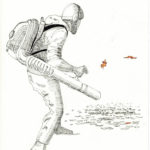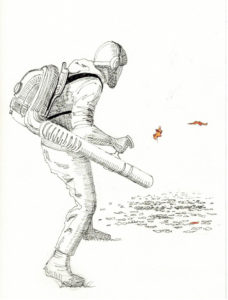
By Barry N. Kaye and Brian Kopperl
Have you ever been in your backyard on a beautiful day when the noise of the leaf blowers next door was so loud that you could not have a quiet conversation, you were dodging the flying debris, and the smell was enough to make you go indoors? Most of us agree that leaf blowers are annoying, but some of us may not know just how harmful they really are.
Gas-powered leaf blowers typically have noise levels of 80 decibels (dB) or higher, which the Centers for Disease Control states can damage hearing. These noise measurements are taken at 50 feet away from the source. They’re even louder if you are closer or if multiple blowers are operating at the same time. The person using the machine is often exposed to noise levels over 100 dB, which can damage hearing in just a few minutes.
Equally concerning, gas-powered leaf blowers often emit more pollution than a truck. Edmunds Auto comparison tests found that a gas-powered leaf blower running for a half-hour emitted as much hydrocarbon as driving a Ford F150 truck more than 3,800 miles! The pollutants that gas-powered leaf blowers emit are much more toxic than automobile exhaust and include carcinogenic chemicals like formaldehyde and benzene as well as nitrous oxide, which is converted to ozone by sunlight.
Leaf blowers also push 300–700 cubic feet of air per minute at 150–250 mph, stirring up large amounts of particles ranging from PM10 (particulate matter of 10 micrometers—think dust) to PM2.5 particles that are so small that they can penetrate and damage the deepest portion of our lungs. These particles are not just leaves. They are anything on the ground, including toxic lawn and weed chemicals and fecal matter from animals.
These toxins and noise do not stay on a homeowner’s property. They affect everyone around, especially the yard workers who are exposed to the noise and pollution all day and often without protective equipment.
Last spring, one of Belmont’s Select Board members proposed a very reasonable set of restrictions to address these issues. Sadly, it was opposed by some landscape businesses and a couple of homeowners who saw this as an infringement on their rights. The motion was tabled.
There are many of us in town who hope that before this coming fall leaf season begins, the Belmont Select Board will adopt leaf blower restrictions along the lines of those passed and operating in neighboring towns, including Arlington, Cambridge, and Brookline. Those neighboring towns’ experience shows that landscapers today have many alternative leaf blowers available that are far less noisy and pollute much less.
In the end, a reasonable balance can and should be struck which caps acceptable sound levels, enforces emission standards (EPA certified), and limits both hours of operation and the number of blowers permitted on a property based on its size. Adopting leaf blower standards in Belmont would protect surrounding neighbors’ quiet enjoyment of their homes while balancing landscapers’ reasonable business needs.
There are some things that we all can do voluntarily in the meantime while we await Select Board action.
- Ask your landscaper to use rakes and electric/battery-powered equipment. Even if they don’t do it today, they will begin to get the message and prepare for change.
- Let them know that leaves are not trash. Leaf mulching your grass is good for the lawn and leaving some leaves in garden beds is good for the soil. While keeping wet leaves off walkways is a safety issue, having a few leaves left on the lawn is not the end of the world. There is no need for three guys with blowers to chase one leaf across the lawn.
- Consider hiring a company that uses all-electric machinery (gas lawn mowers are almost as bad as gas blowers). They are out there and if other landscapers start to see that this is what customers want, they will respond rather than lose business.
- Get the word out. Talk to your friends and neighbors. People may have no idea how bad these machines are or the effects that their use has on their neighbors.
- Lastly, if you’re interested in joining a group discussion to go over the proposed leaf blower regulations in Belmont, please email Sustainable Belmont at sustainablebelmont@gmail.com, with Leaf Blower Event in the subject line, and your name will be added to the list of volunteers working on this effort.
Quiet Landscaping Resources
This list, assembled by the town of Lincoln, is a sampling of local landscapers who will honor requests to not use leaf blowers on your property. Your current landscaper may also be willing stop using leaf blowers on your property if you ask.
AGZA is a national organization which works to improve landscaping practices for better quality of life for communities and better working conditions for equipment operators.
This nonprofit helps communities reduce health and environmental harm from noise via objective, evidence-based approches to noise and pollution.
Barry Kaye, MD, is a Belmont resident and primary care physician at the Mass General Brigham in Everett. Brian Kopperl is managing partner of Renewable Energy Massachusetts LLC, a developer of large, ground-mounted solar facilities in the Commonwealth, and is a member of the Belmont Energy Committee.



Sorry, the comment form is closed at this time.